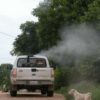 Bees are essential for one out of every three bites of food we eat. But they are being wiped out by the indiscriminant use of bee-toxic pesticides called neonicotinoids, or “neonics.” These neonics are everywhere — in commercial agriculture, on the shelf of your local garden stores, and as it turns out — even in the plants and seeds we buy from nurseries, with no warning to the consumer.
Bees are essential for one out of every three bites of food we eat. But they are being wiped out by the indiscriminant use of bee-toxic pesticides called neonicotinoids, or “neonics.” These neonics are everywhere — in commercial agriculture, on the shelf of your local garden stores, and as it turns out — even in the plants and seeds we buy from nurseries, with no warning to the consumer.
Many “bee friendly” home garden plants sold at Home Depot, Lowe’s, and other leading garden centers have been pre-treated with pesticides shown to harm and kill bees, according to a new, first-of-its-kind pilot study released this week.
Leading home and garden stores in Europe have already taken neonics off the shelves–it’s time for Home Depot and Lowe’s to do the same. While pesticides like neonics may not be the only factor in bee die offs, they are a significant factor, and one that we can do something about.
Tell Home Depot and Lowe’s to rid their stores of bee-toxic pesticides, seeds and garden plants!
“Bees are essential for one out of three bites of food we eat. But they are being wiped out by the indiscriminant use of bee-toxic pesticides called neonicotinoids, or “neonics.” Many “bee friendly” home garden plants sold at Home Depot, Lowe’s, and other leading garden centers have been pre-treated with pesticides shown to harm and kill bees, according to a new, first-of-its-kind pilot study released this week.
A growing body of science shows that these pesticides are a key factor in the global bee die off known as Colony Collapse Disorder. Retailers should stop the sale of neonicotinoid pesticides and neonicotinoid-treated seeds and plants to protect honey bees and other pollinators essential to our food supply and the environment.
The EU has banned neonics and a majority of the UK’s largest home improvement retailers, including Homebase, B&Q and Wickes, have made public commitments to no longer sell products containing pesticides linked to declining bee populations. We call to your company to join these leaders in protecting bees and other vital pollinators by making this same commitment to protect honey bees and other pollinators essential to our food supply and the environment by removing neonic pesticides and neonic-treated seeds and plants from your stores.”




One comment